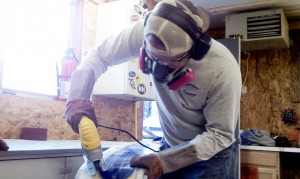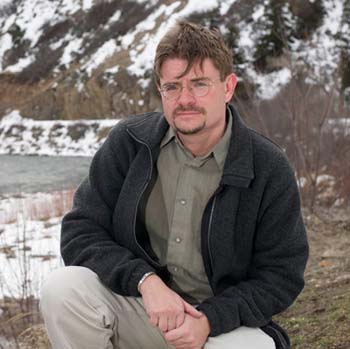If you’re a skier, you’ve probably heard of brands like K2 and Salomon. But what about Meier Skis? The one-man operation, which handcrafts custom skis from local wood, is part of a boom of boutique ski makers that’s making its mark on the industry.
David Frey reports.
(Listen to it here.)
[Sounds of sawing]In a backyard garage in Glenwood Springs, a new pair of skis is taking shape. They’re long, fat, and surprisingly lightweight, and they show off the grain of the locally-cut aspen wood at their core. A new approach to ski making is taking shape here, too. Meier Skis may be a one-man operation, but it’s part of a wave of boutique ski makers muscling in alongside big corporations.
“There are definitely a few.”
Matt Cudmore is the founder of Meier Skis. In his day job, he’s a designer for the engineering firm Schmueser Gordon Meyer. But he’s hoping his new ski business will take off. After making skis for friends for the past few years, he’s selling and renting them to the public this year at Glenwood’s Sunlight Mountain Resort.
“The one thing we’re finding is everyone stamps the ‘handmade’ on their ski but when you look where they’re shipped from, it’s from a factory, whether it’s in Colorado or a factory in China. So that’s what we’re really pushing is that they are handmade and handmade locally.”
About seventy boutique ski makers have opened up across the country, including twenty in Colorado. They include Wagner, near Telluride, Unity, in Silverthorne, and FloSkis in Vail. One of the most famous, Montana Ski Company, counts former N-F-L quarterback Drew Bledsoe as a top investor.
Kelly Davis, research director for the trade group Snowsports Industries of America, says custom ski manufacturers account for one in six ski sales in the country – enough to get the attention of top manufacturers like Rossignol and Dynastar.
“This is such a cool part of the snow sports industry, because we’ve got these really small boutique ski manufacturing operations. So much innovation comes out of that side of the market. Those little companies are really a shot in the arm for the entire industry.”
Another ski industry observer says the rise in boutique ski makers is much like the growth of microbrewed beer – it appeals to customers who wants quality and a homegrown type of product. Eric Edelstein runs the website Exotic-Skis-dot-com, which tracks nearly three hundred small-batch ski and snowboard makers around the world.
“Originally back in the Alpine days of Europe, every little valley and little mountain resort area had their own ski builders that made skis for the people there and the mountain conditions there and then it’s kind of gone to the big corporate industry giant. Now people are learning that, hey, I can make a ski myself and there are a couple of Internet forums where people can learn how to do this and buy the equipment. It’s kind of resonated with a lot of people who say, ‘I can make my own ski and I love it.’
[saw sounds]The skis that come out of Cudmore’s shop seem more like works of art than sports equipment. They have a sidecut for fast turns and a rocker-shaped bottom designed to glide through powder. Instead of fancy graphics, the skis show off their wood cores – aspen, poplar, maple, even beetle-killed pine – mostly made from local timber.
“Nowadays everything is made and shipped from China. That’s just the way it is. I think if we can get something local it will be a movement that people will follow locally. People love the idea of having it made with a wood core from a mountain peak that they can see from town.”
As popular as this small-scale ski business is becoming…competition is tough. Little guys don’t just have to compete with big corporations. They have to compete with each other.
“We’ve seen quite a few come and we’ve seen quite a few go and we’ve seen others absorbed by bigger companies. Every year there’s a fresh one, and sometimes there’s a missing one.”
Jason Flynn is a founder of High Society Freeride Company. He and his buddies started the Snowmass Village company nine years ago with a run of six skis. Since then, they’ve expanded to more than fifty stores in the United States and abroad, selling skis, snowboards and now, outerwear. Flynn says there’s still room for more start ups. Skiers and snowboarders are always looking for the next thing, he says, and they like finding it at a company where you can call up the ski makers themselves.
“I think there’s always a need or a want from the general ski and snowboard populace for something new and fresh. They don’t always want to ride on what everyone else is riding or what’s in the big box stores. Depending on whatever the company’s mantra is or what their reason for existence is, people get behind them. I think that’s what keeps it fun.”
For Cudmore, the mantra is quailty skis, handmade locally.
“You know with all the economic problems we’ve been having these days and stuff getting shipped overseas, nobody really cares what they buy anymore as long as it’s cheap, quality’s just gone out the window. I just want to, you know, in our small little valley, maybe bring that back a little bit.”
If his business catches on, he says, maybe when people think of Glenwood Springs, they’ll think, hey, that’s where Meier Skis are made.
For Aspen Public Radio News, I’m David Frey.


